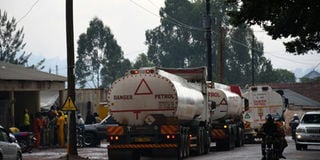Govt starts bulk supply of petroleum products

Projected to rise: Uganda’s public debt, according to IMF, is projected to rise from 49 per cent in the 2020/21 financial year to 50.7 per cent in the 2021/22 financial year. PHOTO BY EDGAR R BATTE
As the country awaits its first oil, Uganda National Oil Company (UNOC) has signed a memorandum of association to supply Stabex International with bulk petroleum products.
Speaking at the signing of the MoU in Kampala on Monday, Ms Proscovia Nabbanja, the UNOC chief executive officer, said the move was in line with the company’s mandate to secure petroleum products in the country in order to attain a footprint in the business.
“Uganda may be a landlocked country but again we are land-linked and most of the petroleum products are passing through Uganda. So this business means we can secure supply of petroleum products within the country but also tap into the regional markets,” she said.
UNOC is entrusted with securing government’s commercial interests in the oil and gas sector.
The arrangement, UNOC said, entails an initial supply of 400,000 litres with the likelihood of scaling up in the future.
UNOC also revealed that the suppliers of the products will keep changing because of the shifting international oil market dynamics depending on aspects such as price, quality and sustainability.
“As we scale up our volumes, we shall enter other supply agreements with other oil marketing companies as we continue to supply the market and reduce the logistic cost through use of the lake transport,” Mr Peter Muliisa, the UNOC chief legal and corporate affairs officer, said.
He, however, declined to reveal how much the country will earn from the initial consignment only saying: “It is profitable, the numbers have been done. The sale is concluded and we are delivering to Stabex but for now, we cannot share how much.”
Mr Daniel Cherutich, the Stabex general manager, said the MoU is expected to mitigate bottlenecks faced by oil marketing companies in the market such as advance payment of taxes.
Stabex has more than 50 supply stations across the country.
According to Mr John Habumugisha, National pipeline company general manager, UNOC will work with government to attain bonded debt, which will allow the oil company to only pay taxes after offloading the products in order to facilitate favourable business conditions.
Uganda currently relies on fuel imported from Kenya through Mombasa, which presents risks in case of disruptions in the Kenyan supply chain.
The country currently has stocks of 30 million litres in a storage terminal in Jinja in eastern Uganda.
At least 6 million litres petroleum products are consumed in Uganda daily.
Mr Habumugisha said because the Jinja facility has only 30 million litres, government is working on another terminal in Kampala with the initial stage expected to in 24 months.
The facility, he said, has the capacity to create space for at least more 60 million litres, which is critical in enabling UNOC engage in bulk supply.
More needed
According to Ms Proscovia Nabbanja, the UNOC chief executive officer, at least $81m is needed to facilitate the construction of another fuel storage terminal in Kampala.
To import fuel, Uganda currently uses wagon ferries to Portbell, Luzira by Uganda Railways Corporation, which has very limited capacity. However, UNOC said it is working with other partners who are innovating alternative means of transport such as badges that can move fuel in larger bulk from Kisumu.
“As we speak, there are companies working on construction of badges. We could be able to move between two to three million litres of petroleum products, which we aren’t able to do using wagons,” Mr Muliisa said, noting the badges, which are cheaper than road transport, will reduce the cost of logistics, which is then reflected at the fuel pump price for final consumers.
A badge is a small vessel for example a ship moving through water with a tank loaded with petroleum.




